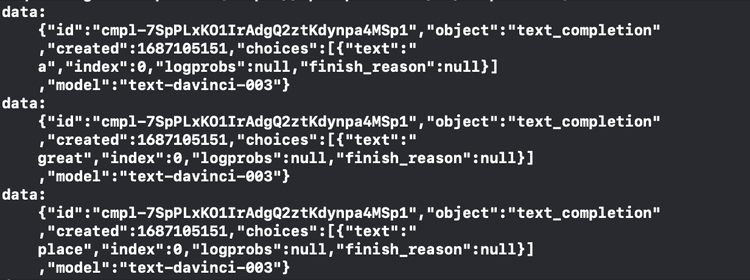
Streaming ChatGPT results to a view using Swift's AsyncSequence
An example of how to stream the text from ChatGPT to an iOS text view using URLSession's bytes(for: delegate:) method.
After comparing the results from the davinci and curie models from ChatGPT, I decided to stick with davinci and come up with a way to stream the results to my text view. After some brief searching, I could only find implementations of how to stream results using Javascript... nothing came up for iOS.
So I made an example using the AsyncSequence functionality of URLSession's bytes(for: delegate:) method.
The method I'm using to get results from ChatGPT looks for a delegate to stream results to, and if it finds one, it sets the HTTP Body attribute "stream" to true.
public func query(languageGeneratorRequest:LanguageGeneratorRequest, delegate:AssistiveChatHostStreamResponseDelegate? = nil) async throws->NSDictionary? {
if searchSession == nil {
searchSession = try await session()
}
guard let searchSession = searchSession else {
throw LanguageGeneratorSessionError.ServiceNotFound
}
let components = URLComponents(string: LanguageGeneratorSession.serverUrl)
guard let url = components?.url else {
throw LanguageGeneratorSessionError.ServiceNotFound
}
var request = URLRequest(url:url)
request.httpMethod = "POST"
request.setValue("application/json", forHTTPHeaderField: "Content-Type")
request.setValue("Bearer \(self.openaiApiKey)", forHTTPHeaderField: "Authorization")
var body:[String : Any] = ["model":languageGeneratorRequest.model, "prompt":languageGeneratorRequest.prompt, "max_tokens":languageGeneratorRequest.maxTokens,"temperature":languageGeneratorRequest.temperature]
if let stop = languageGeneratorRequest.stop {
body["stop"] = stop
}
if let user = languageGeneratorRequest.user {
body["user"] = user
}
if delegate != nil {
body["stream"] = true
}
let jsonData = try JSONSerialization.data(withJSONObject: body)
request.httpBody = jsonData
if let delegate = delegate {
return try await fetchBytes(urlRequest: request, apiKey: self.openaiApiKey, session: searchSession, delegate: delegate)
} else {
return try await fetch(urlRequest: request, apiKey: self.openaiApiKey) as? NSDictionary
}
}
If the streaming function is called, it uses the version of URLSession that returns bytes asynchronously.
internal func fetchBytes(urlRequest:URLRequest, apiKey:String, session:URLSession, delegate:AssistiveChatHostStreamResponseDelegate) async throws -> NSDictionary? {
print("Requesting URL: \(String(describing: urlRequest.url))")
let (bytes, response) = try await session.bytes(for: urlRequest)
guard let httpResponse = response as? HTTPURLResponse, httpResponse.statusCode == 200 else {
throw LanguageGeneratorSessionError.InvalidServerResponse
}
let retVal = NSMutableDictionary()
var fullString = ""
for try await line in bytes.lines {
if line == "data: [DONE]" {
break
}
guard let d = line.dropFirst(5).data(using: .utf8) else {
throw LanguageGeneratorSessionError.InvalidServerResponse
}
guard let json = try JSONSerialization.jsonObject(with: d) as? NSDictionary else {
throw LanguageGeneratorSessionError.InvalidServerResponse
}
guard let choices = json["choices"] as? [NSDictionary] else {
throw LanguageGeneratorSessionError.InvalidServerResponse
}
if let firstChoice = choices.first, let text = firstChoice["text"] as? String {
fullString.append(text)
delegate.didReceiveStreamingResult(with: text)
}
}
fullString = fullString.trimmingCharacters(in: .whitespaces)
retVal["text"] = fullString
return retVal
}
Most of the code above looks for the partial response and extracts the text from the pseudo-dictionary returned. The response looks like this:
data: {"id":"cmpl-7SpPLxKO1IrAdgQ2ztKdynpa4MSp1","object":"text_completion","created":1687105151,"choices":[{"text":" sushi","index":0,"logprobs":null,"finish_reason":null}],"model":"text-davinci-003"}
The function also gathers the full response into a string and returns that in a dictionary of its own... although that goes unused in my code as of right now. I intend to cache these responses in iCloud at some point, so it makes sense to do both in the long run.
©2023, Secret Atomics